It's not just a shot in the dark, it's practically certain that vaccinations will feature prominently in the news this week. Timed to coincide with European Immunization Week, organised by WHO Europe, the European Commission has announced efforts to increase take up of vaccinations in the EU and the Luxembourg ministry of health has just posted a video (in French) featuring Dr Simone Steil, head of its preventable medicine division, answering numerous questions about vaccinations.
Although vaccination has saved millions of lives from infectious diseases including smallpox, measles, diphtheria and meningitis, a combination of complacency and mistrust is leading to lower rates of coverage in the EU, with disastrous consequences. There have been unprecedented outbreaks of vaccine-preventable diseases in the EU, including measles. In 2017, for example, over 14,000 people contracted measles--more than three times the number reported in 2016.
According to Dr Steil, the coverage rate in Luxembourg is good, reaching 95% for most diseases. This provides what is termed 'herd' immunity. That might be partly because recipients of family allowance are required to take their child to the paediatrician six times within the infant's first two years of life, ensuring that children get off to a good start and that new parents receive qualified medical advice.
“We strongly believe in vaccination as a preventative measure,” says Dr Sigurlaug Agustsson of the Paediatric Centre in Val St. Croix. “While we are open to discussing parents' concerns about one or another vaccine, we feel it is irresponsible if parents decide not to vaccinate their children at all. It not only endangers their child's health, but also the health of all other children. If parents refuse to vaccinate at all, we cannot take on the responsibility for their child's health and cannot therefore accept them as a patient.”
Misinformation
Agustsson feels confidence in vaccinations is waning. “People are scared to take a decision. They're scared about everything today. There is a huge amount of misinformation online and the anti-vaccination forces are aggressive and very active--they even send brochures to people who place birth announcements in the newspapers.”
Why are there so many nay-sayers if there's nothing to worry about? “It's very easy to make links that are not there. If anyone has any health issue at all, they ask them if they had a vaccination, and if they have, they blame vaccines. The anti-vaccination league pack emotional messages, but we have science on our side. There are rigorous processes involved in getting a vaccination on the market, and rigorous follow-up. I have never seen a serious adverse effect from a vaccination, and I have been working with children from new-borns up to the age of 18 for ten years,” says Agustsson.
In her online video, Steil also says mild side effects like localised redness and swelling, nausea and fever are infrequent and serious side effects extremely rare. She also says that it isn't just children who need vaccinations. “Many vaccines, like those for polio, diphtheria and tetanus, do not supply lifelong coverage and should be repeated every ten years.”
In multi-cultural Luxembourg, the fact that vaccination schedules currently differ from country to country can add to the confusion. To help people know what vaccines to take and when to take them, the European Commission plans to work with member states to establish a core EU vaccination schedule by 2020.
And to counter all the fake news you can find surfing the web--or in your mailbox--the commission also plans to create a web portal next year to address genuine concerns by providing clear, verifiable and transparent data.
Wendy Winn is editor of the Health-EU Newsletter for the "Country Knowledge and Scientific Committees" of the European Commission DG Health and Food Safety
